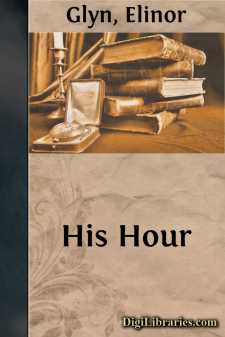Categories
- Antiques & Collectibles 13
- Architecture 36
- Art 48
- Bibles 22
- Biography & Autobiography 813
- Body, Mind & Spirit 142
- Business & Economics 28
- Children's Books 16
- Children's Fiction 13
- Computers 4
- Cooking 94
- Crafts & Hobbies 4
- Drama 346
- Education 46
- Family & Relationships 57
- Fiction 11829
- Games 19
- Gardening 17
- Health & Fitness 34
- History 1377
- House & Home 1
- Humor 147
- Juvenile Fiction 1873
- Juvenile Nonfiction 202
- Language Arts & Disciplines 88
- Law 16
- Literary Collections 686
- Literary Criticism 179
- Mathematics 13
- Medical 41
- Music 40
- Nature 179
- Non-Classifiable 1768
- Performing Arts 7
- Periodicals 1453
- Philosophy 64
- Photography 2
- Poetry 896
- Political Science 203
- Psychology 42
- Reference 154
- Religion 513
- Science 126
- Self-Help 84
- Social Science 81
- Sports & Recreation 34
- Study Aids 3
- Technology & Engineering 59
- Transportation 23
- Travel 463
- True Crime 29
Elinor Glyn
Elinor Glyn was a British novelist and scriptwriter known for her pioneering work in romantic fiction and for popularizing the concept of the "It Girl." Born in 1864, she achieved fame in the early 20th century with her scandalous novels, such as "Three Weeks," which challenged contemporary social norms. Glyn also worked in Hollywood, contributing to the early film industry by writing screenplays and consulting on romantic scenes.
Author's Books:
Sort by:
by:
Elinor Glyn
CHAPTER I People often wondered what nation the great financier, Francis Markrute, originally sprang from. He was now a naturalized Englishman and he looked English enough. He was slight and fair, and had an immaculately groomed appearance generally—which even the best of valets cannot always produce. He wore his clothes with that quiet, unconscious air which is particularly English. He had no...
more...
by:
Elinor Glyn
THE DAMSEL AND THE SAGE nd the Damsel said to the Sage: "Now, what is life? And why does the fruit taste bitter in the mouth?" And the Sage answered, as he stepped from his cave: "My child, there was once a man who had two ears like other people. They were naturally necessary for his enjoyment of the day. But one of these ears offended his head. It behaved with stupidity, thinking thereby...
more...
by:
Elinor Glyn
CHAPTER I The restaurant of the Grand Hotel in Rome was filling up. People were dining rather late—it was the end of May and the entertainments were lessening, so they could dawdle over their repasts and smoke their cigarettes in peace. Stella Rawson came in with her uncle and aunt, Canon and the Honorable Mrs. Ebley, and they took their seats in a secluded corner. They looked a little out of...
more...
by:
Elinor Glyn
I February, 1918. I am sick of my lifeâThe war has robbed it of all that a young man can find of joy. I look at my mutilated face before I replace the black patch over the left eye, and I realize that, with my crooked shoulder, and the leg gone from the right knee downwards, that no woman can feel emotion for me again in this world. So be itâI must be a philosopher. Mercifully I have no near...
more...
by:
Elinor Glyn
I I have wondered sometimes if there are not perhaps some disadvantages in having really blue blood in one's veins, like grandmamma and me. For instance, if we were ordinary, common people our teeth would chatter naturally with cold when we have to go to bed without fires in our rooms in December; but we pretend we like sleeping in "well-aired rooms"—at least I have to. Grandmamma simply...
more...
by:
Elinor Glyn
I The hours were composed mostly of dull or rebellious moments during the period of Theodora's engagement to Mr. Brown. From the very first she had thought it hard that she should have had to take this situation, instead of Sarah or Clementine, her elder step-sisters, so much nearer his age than herself. To do them justice, either of these ladies would have been glad to relieve her of the...
more...
by:
Elinor Glyn
CHAPTER I The Sphinx was smiling its eternal smile. It was two o'clock in the morning. The tourists had returned to Cairo, and only an Arab or two lingered near the boy who held Tamara's camel, and then gradually slunk away; thus, but for Hafis, she was alone—alone with her thoughts and the Sphinx. The strange, mystical face looked straight at her from the elevation where she sat. Its...
more...
by:
Elinor Glyn
NAZEBY HALL It was perhaps a fortunate thing for Elizabeth that her ancestors went back to the Conquest, and that she numbered at least two Countesses and a Duchess among her relatives. Her father had died some years ago, and, her mother being an invalid, she had lived a good deal abroad. But, at about seventeen, Elizabeth began to pay visits among her kinsfolk. It was after arriving at Nazeby Hall,...
more...
by:
Elinor Glyn
CHAPTER I "If one consciously and deliberately desires happiness on this plane," said the Russian, "one must have sufficient strength of will to banish all thought. The moment that one begins to probe the meaning of things, one has opened Pandora's box and it may be many lives before one discovers hope lying at the bottom of it." "What do you mean by thought? How can one not...
more...
by:
Elinor Glyn
CHAPTER I Michael Arranstoun folded a letter which he had been reading for the seventh time, with a vicious intentness, and then jumping up from the big leather chair in which he had been buried, he said aloud, "Damn!" When a young, rich and good-looking man says that particular word aloud with a fearful grind of the teeth, one may know that he is in the very devil of a temper! Michael...
more...











